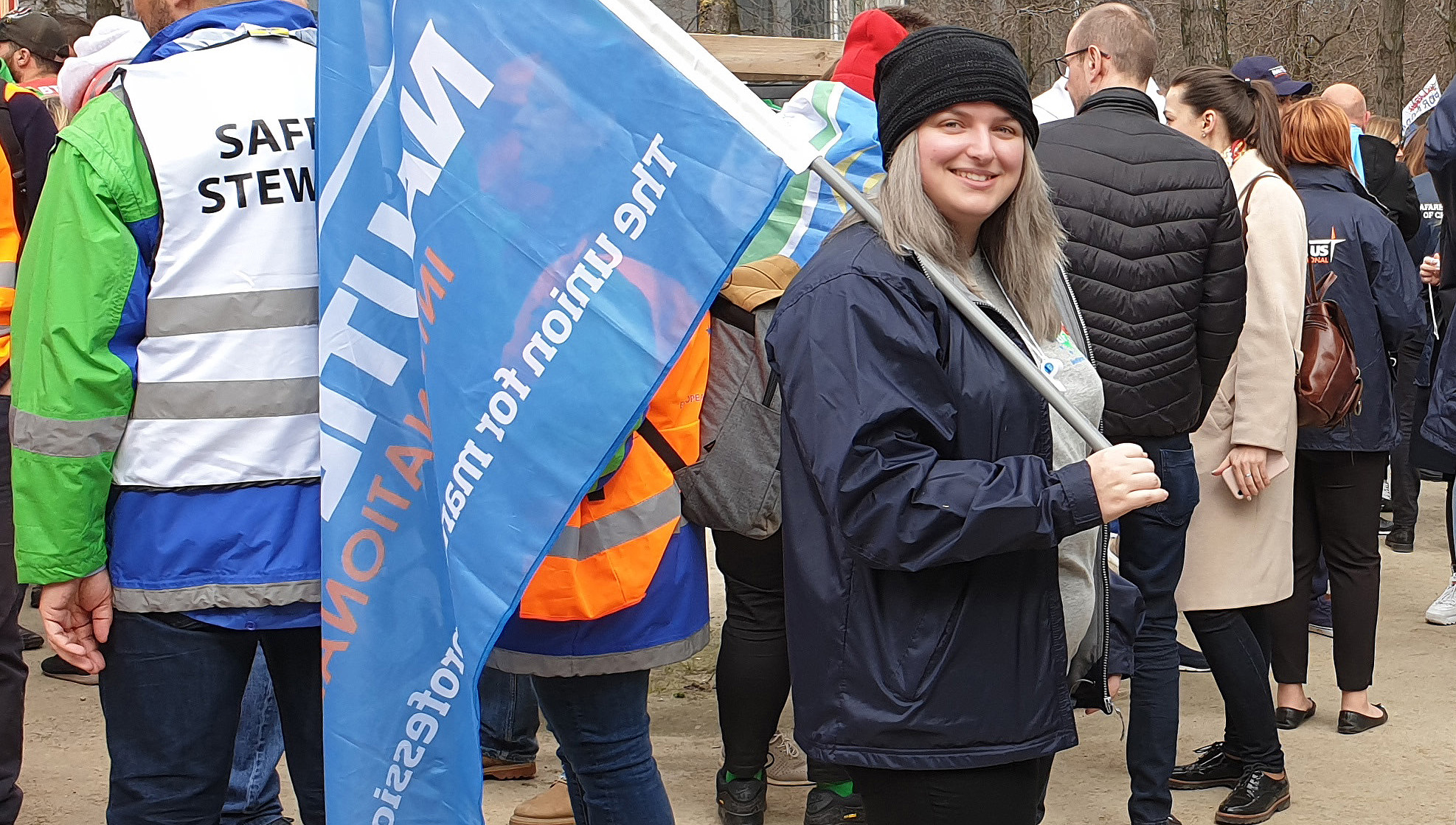- Topics
- Campaigning
- Careers
- Colleges
- Community
- Education and training
- Environment
- Equality
- Federation
- General secretary message
- Government
- Health and safety
- History
- Industrial
- International
- Law
- Members at work
- Nautilus news
- Nautilus partnerships
- Netherlands
- Open days
- Opinion
- Organising
- Podcasts from Nautilus
- Sponsored content
- Switzerland
- Technology
- Ukraine
- United Kingdom
- Welfare

Second officer Sam Belfitt is adaptable. She gained a degree in aviation before the lack of jobs pushed her to follow in the wake of her maritime ancestors. She provides some useful insights into working in the ferry sector and argues more needs to be done to retain seafarers who want to combine parenthood
What is a typical day in your job?
A typical day involves the navigation of the ship between Dover and Dunkirk, the loading and discharging of cars and lorries on the car decks, the maintenance of life saving appliances (LSA) and firefighting equipment FFE and all the admin that goes along with that.
Why did you choose a career at sea?
I graduated from university during the most recent economic crash. I struggled to find work doing anything. My dad filled in the application form, and next thing I knew, I was starting at Fleetwood Nautical College. I figured it would at least keep me busy for three years while the job market improved.
But I haven't looked back! My dad was in the Royal Navy and my granddad (my mum's dad) was an engineer on the RMS Queen Elizabeth.
Before I became a Merchant Navy trainee, I went to university and gained my degree in Aviation Technology and Pilot Studies.
Tell us some of your career highlights so far – and career challenges
By far the best highlight was working my first job as an Officer of the Watch (OOW) being a navigator on the hovercraft. It was one of the best things I have ever done jobwise, and not only because I'm a little bit of a hovercraft nerd.
Other highlights include crossing the Arctic circle and experiencing 24 hours of sunlight. I finished my watch at midnight and the sun went down to the horizon, stayed there for a short while, then started rising again. I am sure some people have some amazing stories but for me it is always the little things that remind me why I do this as opposed to a 'normal' job.
The biggest challenge for me has been gaining a permanent position that allows me to have a family life with my partner and cat. I have finally achieved this in the last year, but it has taken many years to get this far.
Another big challenge I have faced is a feeling that I must prove myself compared to male peers. I have been involved in incidences where a senior manager has commented that I was 'only there for diversity numbers' and yet publicly the company advertises that they are employing female deck officers.
It completely disregards all the effort I have put in gaining my tickets and certification. You end up having to try twice as hard just to show you are half as good regardless of how you perform. It's frustrating but is getting better, even in the few years I have been in this industry.
By far the best highlight was working my first job as an Officer of the Watch (OOW) being a navigator on the hovercraft. It was one of the best things I have ever done Sam Belfitt, Nautilus Council member and third officer
How can women be made to feel welcome and retained in a career at sea?
I think more needs to be done to allow seafarers to work at sea and have a family. There is very little advice out there and not much support for women who want to go back to sea.
Currently statutory maternity [in the UK] doesn't support people who work contract to contract, and paternity doesn't really allow the partner to take enough time off to assist the mother to enable her to go back to work when conditions allow. [UK legislation differentiates between entitlement to leave and entitlement to pay. In some cases the right to leave exists, but the right to pay often does not]. It is certainly something that worries me.
More also needs to be done to encourage women that this is a good career, and that they can do it long term. There are a lot of schemes and government initiatives currently happening in schools, so only time will tell if these have been successful.
What are the best things about your job?
The best part of my job is only working two weeks per month. I love having the time to chill and do things at home. I love that when I am at work, I don't have to deal with a commute in traffic; my work is very varied, and no two days are the same. The other plus is I am not stuck at a desk.
Would you recommend seafaring as a career?
Yes. if you are someone who wants adventure and to do something different but doesn't want to join the military, it is a great job. No one knows what the future holds, but I intend to stay at sea as long as I can.
Tags
